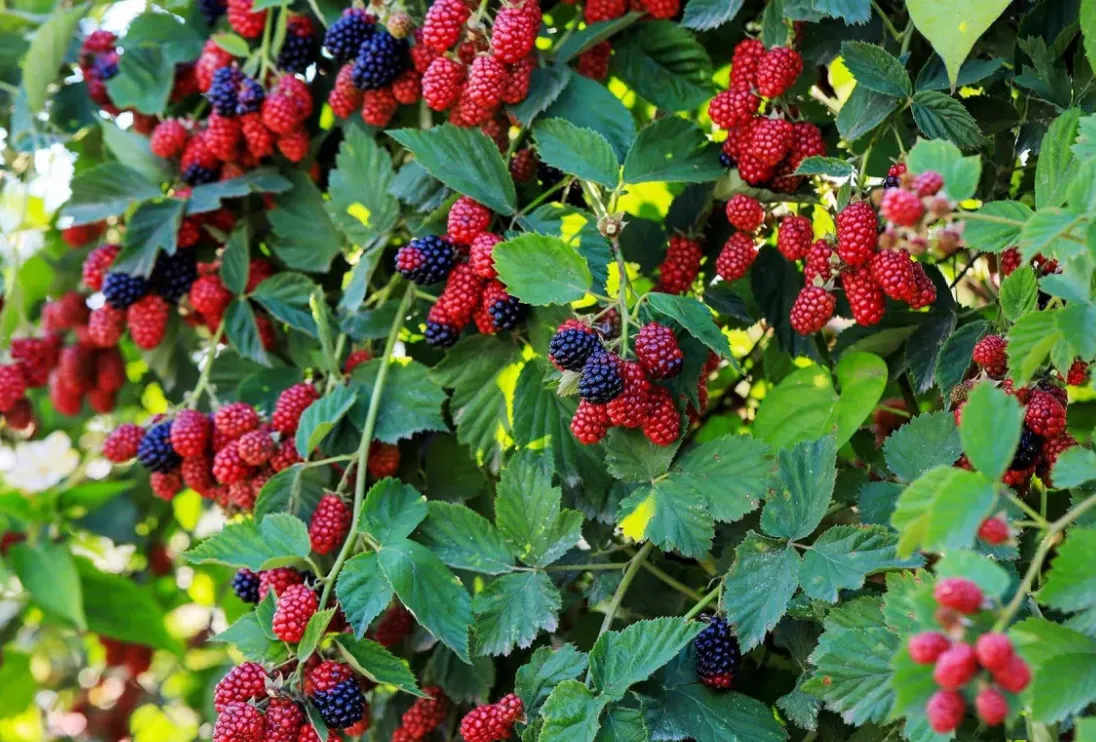
Growing Raspberries Organically
Growing raspberries organically involves following practices that prioritize soil health, pest and disease management, and sustainable gardening methods. Here's a step-by-step guide to growing raspberries organically:
1. Selecting Raspberry Varieties:
Choose raspberry varieties that are well-suited to your climate and growing conditions. Consider factors such as cold hardiness, disease resistance, and fruiting season.
2. Site Selection:
Choose a sunny location with well-drained soil for planting raspberries. Avoid areas prone to waterlogging or poor drainage.
Ensure good air circulation to minimize the risk of fungal diseases. Avoid planting raspberries in low-lying or sheltered areas where air may stagnate.
3. Soil Preparation:
Test the soil pH and amend it as necessary to achieve a slightly acidic to neutral pH range of 5.5-6.5, which is ideal for raspberry cultivation.
Using things like peat moss or organic sulfur applied on the top of the soil and/or around the roots will help make the soil more acidic.
Incorporate plenty of organic matter such as compost, well-rotted manure, or leaf mulch into the soil to improve fertility, structure, and moisture retention.
4. Planting Raspberries:
Plant raspberry canes in the early spring or late fall when the soil is moist and temperatures are cool.
Space raspberry plants 2-3 feet apart in rows, with 6-8 feet between rows to allow for adequate air circulation and room for plant growth.
Dig planting holes slightly larger than the root ball of the raspberry plants and backfill with amended soil.
Set the plants at the same depth they were growing in the nursery and water thoroughly after planting.
5. Watering and Mulching:
Water raspberry plants regularly, especially during dry periods, to keep the soil consistently moist but not waterlogged.
Apply a layer of organic mulch such as straw, wood chips, or shredded leaves around the base of raspberry plants to suppress weeds, retain soil moisture, and regulate soil temperature.
6. Fertilizing:
Use organic fertilizers such as compost, aged manure, or fish emulsion to provide nutrients to raspberry plants.
Apply fertilizers sparingly and avoid over-fertilization, as excessive nitrogen can promote vegetative growth at the expense of fruit production.
7. Pruning and Training:

Prune raspberry canes annually to remove dead, diseased, or damaged wood and encourage vigorous new growth.
Train raspberry canes onto a trellis or support system to keep them upright, improve air circulation, and facilitate harvesting.
8. Pest and Disease Management:
Monitor raspberry plants regularly for signs of pests such as aphids, spider mites, and Japanese beetles. Use insecticidal soap or neem oil for organic pest control if necessary.
Deter Japanese Beetles from your Raspberries
Plant Hazelnut tree/bush nearby (which they won’t do much damage to) and they don't bother the raspberries because we have other plants nearby that they prefer. You can also have other "trap plants" that do the same for other bugs. Mustard greens, for example, are a great trap plant for harlequin bugs.
Practice good sanitation by removing and disposing of any diseased or infested plant material promptly to prevent the spread of pests and diseases.
Choose disease-resistant raspberry varieties whenever possible and rotate raspberry plantings to reduce the buildup of soilborne pathogens.
Protect Your Raspberries from Deer
Plant rosemary around your garden and near your raspberries. Deer hate the smell of rosemary.
9. Harvesting:
Harvest ripe raspberries regularly as soon as they are fully colored and easily detach from the plant with a gentle tug.
Handle raspberries carefully to avoid bruising or crushing the delicate fruit, and refrigerate them promptly after harvesting to prolong shelf life.
By following these organic growing practices, you can cultivate healthy, productive raspberry plants and enjoy a bountiful harvest of delicious, chemical-free fruit.

